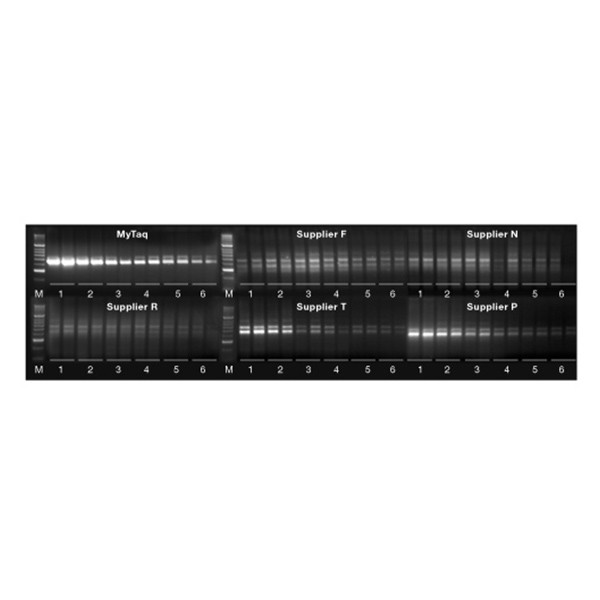Ordering
*link will take you to our exclusive distribution partner site
*link will take you to our exclusive distribution partner site
MyTaq™ Mix is recommended for all standard PCR applications. MyTaq Mix a unique combination of MyTaq DNA Polymerase and a novel buffer system that deliver very high yield PCR amplification over a wide range of PCR templates. MyTaq has an increased affinity for DNA, enabling reliable amplification from even very low amounts of template. MyTaq DNA Polymerase has been developed to give more robust amplification than other commonly-used polymerases allowing it to perform well with challenging templates in the presence of PCR inhibitors. Furthermore, the highly efficient nature of MyTaq means it gives excellent results under fast PCR conditions.
The product is supplied as a mastermix that requires the addition of only template, primers and water, thereby reducing the number of pipetting steps during PCR set-up, for improved speed, throughput and assay reproducibility. The inclusion of dNTPs, MgCl2 and enhancers at optimal concentrations helps eliminate the need for optimization, thereby saving time, effort and the cost of performing unnecessary assay repeats.
The combination of MyTaq and optimized buffer system allow for faster PCR reactions compared with other polymerases, therefore reducing overall run time from approximately 1 hour to under 30 minutes. This is achieved without compromising specificity or yield, reducing the reaction time allows for increased throughput and faster time to results.

MyTaq was compared with DNA polymerases form others suppliers for the amplification of a 450 bp fragment of the human myc gene (61% GC rich). Decreasing amounts of human genomic DNA were used as template (1 mg, 200 ng, 100 ng, 50 ng, 25 ng and 12.5 ng; lanes 1-6 respectively) in the PCR. Marker is HyperLadder 1kb (M). MyTaq delivers higher yield and sensitivity compared to five polymerases from alternative suppliers.
A 450 bp fragment of the human myc gene (61% GC rich) was amplified under fast conditions using MyTaq with a DNA polymerase from supplier S. The PCR was performed using both enzymes and a three-fold decreasing amount of human genomic DNA as template (200 ng - 30 pg; lanes 1-8 respectively). Marker is HyperLadder 1kb (M). MyTaq amplifies the target more efficiently under fast conditions, resulting in higher yield, without the need for further optimization.
|
Reagent |
200 Reactions |
1000 Reactions |
|
MyTaq Mix, 2x |
4 x 1.25 mL |
20 x 1.25 mL |
2x
All components are shipped on dry/blue ice and should be stored at -20°C upon receipt for optimum stability. Repeated freeze/thaw cycles should be avoided. When stored under the recommended conditions and handled correctly, full activity of the reagents is retained until the expiry date on the outer box label.
Components may also be stored at +4°C if required, although storage at -20°C is recommended. When stored at +4°C, reagents will remain stable for a period of 2 weeks from date of receipt.
| Observation | Recommended Solution(s) |
| No or low PCR yield | Enzyme concentration too low – increase the amount of enzyme in 0.5 U increments. |
| Primers degraded – check quality and age of the primers. | |
| Magnesium concentration too low – increase concentration in 0.25 mM increments with a starting concentration of 1.75 mM. | |
| Primer concentration not optimized. Titrate primer concentration (0.3-1 µM); ensuring that both primers have the same concentration. | |
| Template concentration too low – Increase concentration of template. | |
| Perform a positive control to ensure that the enzyme, dNTPs and buffers are not degraded and/or contaminated. | |
| Multiple Bands | Primer annealing temperature too low. Increase annealing temperature. Primer annealing should be at least 5°C below the calculated Tm of primers. |
| Prepare master mixes on ice or use a heat-activated polymerase. | |
| For problems with low specificity. Try adding 3% DMSO (not supplied) to improve specificity. | |
| Smearing or artifacts | Template concentration too high. Prepare serial dilutions of template. |
| Too many cycles. Reduce the cycle number by 3-5 to remove non-specific bands. | |
| Enzyme concentration too high - decrease the amount of enzyme in 0.5 U increments. | |
| Extension time too long. Reduce extension time in 0.5-1 minute increments. |
Please click here in order to request your sample. You will receive an email confirmation within two business days with delivery details.